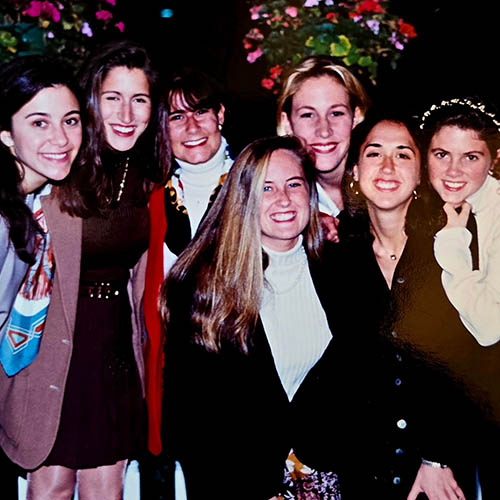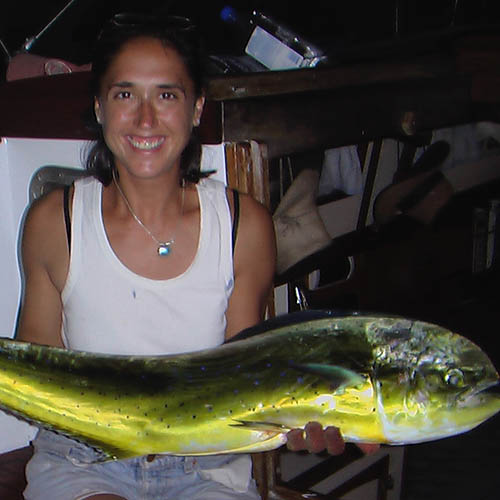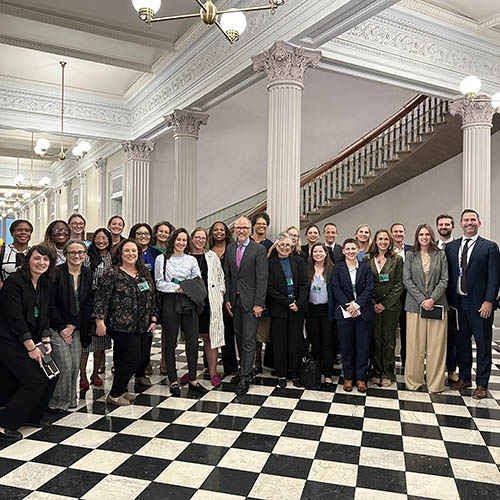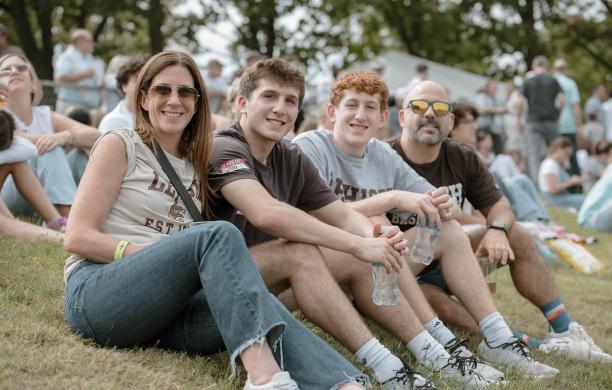Launched in 2024 as the first University Research Center at Lehigh, the Center for Catastrophe Modeling and Resilience serves as an interdisciplinary home for researchers across academia, business, and government who use simulations to estimate the potential losses from catastrophic events.
While the center is advancing how data informs preparation and response to global catastrophes, Lehigh graduates have been pioneers in this field for years. Meet one leader who is bringing awareness, action, and change to this global opportunity.
Jillian Blanchard ’95
Government and Economics
Background
Blanchard grew up in the frigid temperatures of Rochester, New York, skiing on ice and attending Buffalo Bills playoff games with her dad and brother. She attended Brighton High School and wasn’t set on a definitive career path, but she loved to debate and fiercely defend justice. She spent all “10 months” of Rochester winters playing in the snow, learning to live with the harsh realities of winter storms.
She was lucky to be in a family that prioritized travel and adventure, enjoying Canada, Europe, and Israel before heading off to college. She spent a summer at the Harvard Summer Program, which gave her the credentials to get an academic scholarship to Lehigh. Given Lehigh’s excellent education, Blanchard was all too happy to join the Class of 1995.

Lehigh Days
Blanchard studied political theory, government, and economics. She recalls the impact of her Introduction to Political Thought class taught by Richard Matthews, professor of political science, who just retired after a 36-year career. Her goal was to go to law school, so she challenged herself on a pre-law track.
But Blanchard also had fun. She was an active member of Delta Gamma, was on the Lehigh ski team, and remembers cheering on the Bills during consecutive Super Bowl appearances.
She did well on the LSAT and was accepted to several law programs, but she deferred, taking a year off to live in San Francisco. She loved being out West and soon enrolled in Hastings College of the Law at the University of California (now called UC College of the Law, San Francisco). There, she took an environmental law course and was hooked.
Work
She began her legal career at Sheppard Mullin working on environmental compliance, ensuring that residential and commercial developers followed water, land, and endangered species protections. Doing similar work, she then practiced at Bingham McCutchen. Her cases at the firms provided invaluable training and deepened her expertise in environmental law and policy.

But then life took a turn. She and her husband decided to sail from San Francisco to Australia on a 35-foot steel cutter-rigged sailboat called the “Mortal Coil.” They fished for their meals, catching fresh tuna or mahi-mahi while trolling with a lure. This jaunt ended up lasting three years. During their passages, they faced heat, storms, gear failures like a broken boom, and even sailed through a hurricane. The experience, while amazing and beautiful, taught her about the fragility of humans as we navigate this mortal coil and how much our life force relies on harmony with habitat.
When she returned to civilization, her focus became environmental policy, helping the local government protect air, water, and climate. She managed all infrastructure permitting for the San Francisco Public Utilities Commission and worked alongside the Environmental Protection Agency, U.S. Army Corps of Engineers, and U.S. Fish and Wildlife Service to upgrade the entire water system for the city of San Francisco.
Work Made Personal
Blanchard then had a child, which motivated her to venture out on her own, starting Rudder Law Group, where she served as managing partner. For 12 years, she balanced parenthood and assisted public projects around the San Francisco Bay, like building the 2013 America’s Cup Project and many waterfront parks. The impact she was making locally became something she wanted to take further, especially as the rule of law seemed to be shifting in the country and people and the planet needed greater protection.

That’s when Blanchard began to volunteer for Lawyers for Good Government (L4GG), an organization dedicated to mobilizing lawyers to ensure that all levels of government — federal, state, and local — promote equal justice under the law and uphold civil and human rights, including the rights to health and to live in a healthy environment.
In 2017, Blanchard worked pro bono to help L4GG start a Climate Change and Environmental Justice (CCEJ) Program to help protect people and the planet. At that point, the team was lean. Even so, it worked with 800 state and local governments to secure funds and implement projects that advanced L4GG’s mission to address climate change.
She now serves as vice president of the CCEJ Program, with a staff of over 25, where she has managed over 700 pro bono attorneys providing critical guidance to cities, states, and nonprofit partners to help expedite the country's shift to a clean and equitable green economy and to address environmental justice.
Catastrophe Modeling
Blanchard believes that catastrophe modeling is not a political issue but a scientific one that’s critical to our survival. Folks in government have an opportunity to make short-term gains on a long-term problem. For her, humans win when we work with nature, not against it. That is why being heard, sharing knowledge, accessing resources, leveraging tools, and helping others move forward on climate science are crucial, she says.
She has seen the difference between what people say in public about climate science as compared to the actions they take in private because the science is clear. Insurance companies, governments, and nonprofits — and even fossil fuel companies — are seeking advice and making adjustments because the economic stakes are so high.
There are organizations and researchers doing incredible things that need legal assistance, she says. As just one example, L4GG is working with 24 governor’s offices to model policies and provide technical assistance to protect people and the planet. She has helped religious organizations become climate resilience centers to assist citizens in need when storms hit in North Carolina, Florida, and Louisiana. She is helping communities reduce the impact of catastrophes by leveraging federal funding and tax credits, using models to create more resilient infrastructure, and working together to mitigate risk.
Blanchard believes that when science and policy align, both people and their property are better protected, and that has never been more important than right now.


